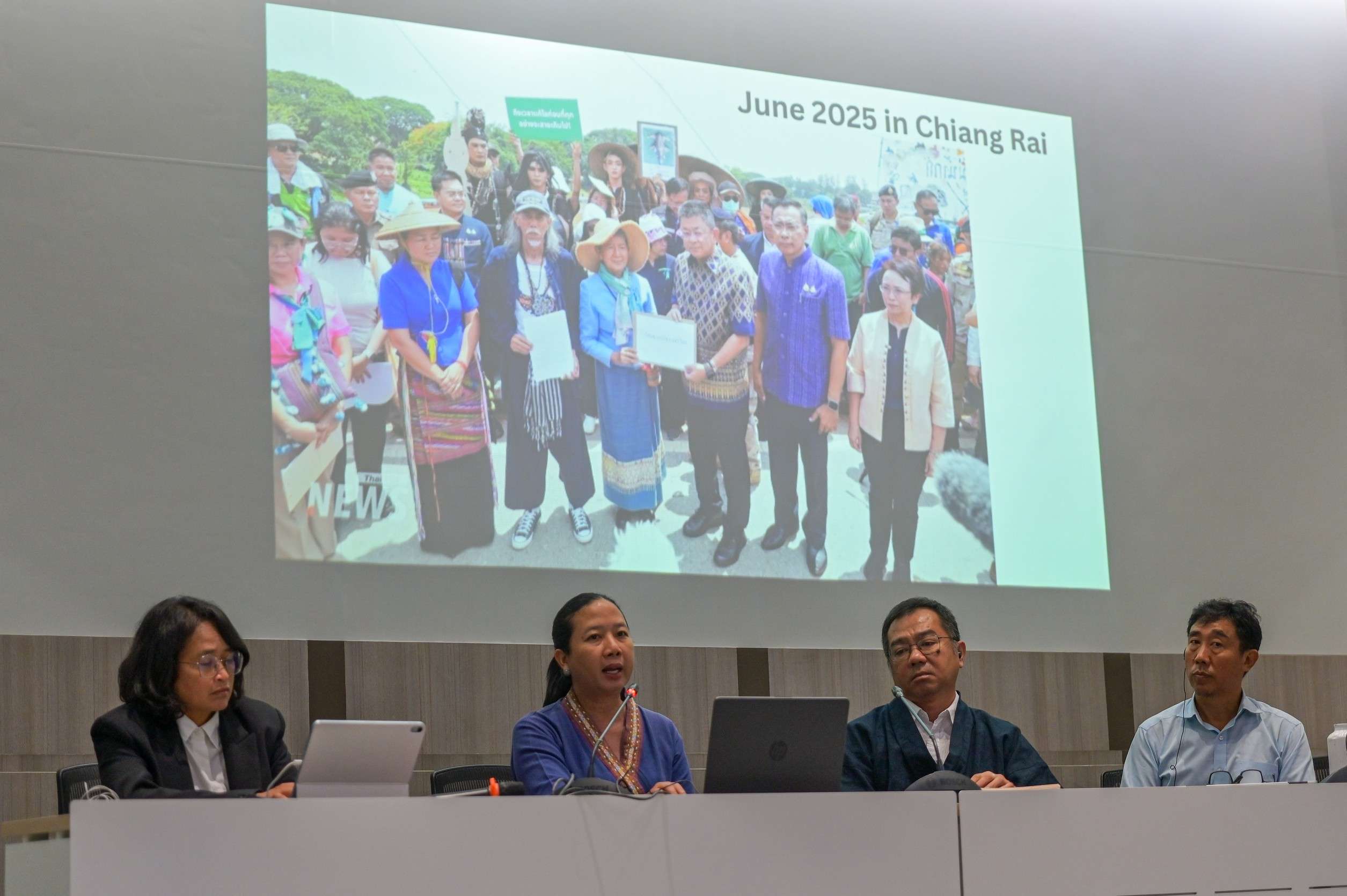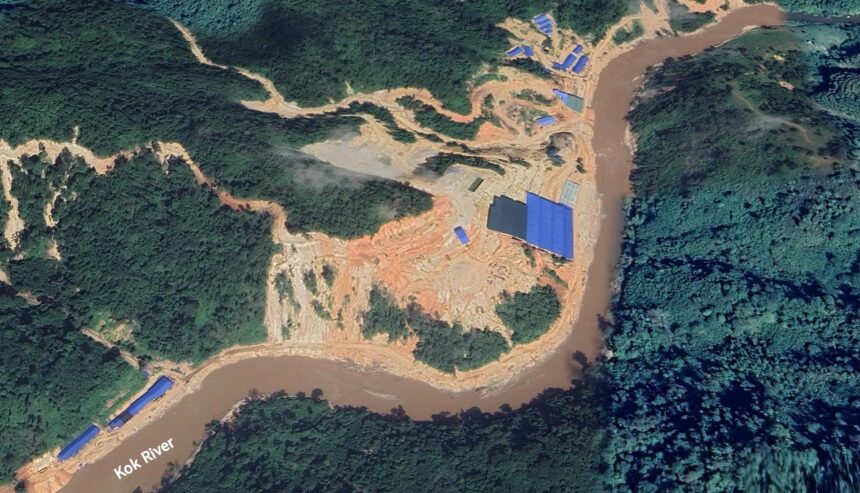BANGKOK– On Friday, Chulalongkorn University hosted a seminar about the current contamination problem facing Chiang Rai’s Kok, Ruak, and Mekong Rivers, and the rare earth mining taking place in the upper part of Shan State, Myanmar, by China.
Attending the seminar were the House Committee on Law, Justice and Human Rights, together with the Mekong Studies Centre at the Institute of Asian Studies, Chulalongkorn University, and the People’s Network for the Protection of the Kok, Sai and Mekong Rivers.
The seminar was held to address the legal frameworks and international mechanisms to address transboundary pollution from rare earth mining in Myanmar’s Shan State and the Upper Mekong. Anuk Pitukthanin, Director of the Mekong Studies Centre, welcomed participants and thanked the committee for prioritizing cross-border pollution.

He said the rare earth mining issue must be managed beyond local communities and treated as a regional concern.
Kanwee Suebsaeng, list MP for the Fair Party and deputy chair of the House committee, said the House considered the Clean Air Bill yesterday, 25 September. One section deals with transboundary pollution. He asked the drafters how Thailand could bring civil action against foreign operators whose activities in neighbouring countries harm Thailand.
He said the Thai law that applies across borders is still unclear. The government will deliver its policy statement on 29 to 30 September, yet there is no clear plan for managing transboundary pollution. He called on all governments to prevent and tackle pollution that crosses into Thailand. Local talks continue, he said, but the issue has not been elevated to a national agenda or an effective international platform.
Pressuring Myanmar and China
Kanwee added that findings from the seminar would be submitted to the incoming government during the policy statement. He urged action at the ASEAN and international levels, using constructive diplomacy to press Myanmar and China to deal with the problem.
At the session on the rare earth mining situation, Zung Ting from the Kachin environmental network reported that conditions in Myanmar’s Kachin State have worsened over the past decade, and even more since the 2021 coup.

Kachin holds vast resources amid high global demand for rare earths to feed clean energy supply chains and stockpiles in the United States, the European Union and Japan. Mining sites are located in Kachin, with China playing a major role in extracting ore and adding value.
He said China focuses on processing to add value at home, while avoiding mining on its own soil due to severe environmental harm. Chinese policy shifted to limit domestic rare earth mining by Chinese firms, pushing operations into several areas of Myanmar. Activity rose sharply after 2015, then increased again after the 2021 coup.
Zung said the absence of control is alarming. Rare earth mining sites in Kachin have increased by more than 60 percent, with over 5,000 chemical ponds across about 400 mines. Similar mines and ponds have spread to Shan State. The impact falls heavily on local communities and indigenous peoples, with severe flooding every year. More countries are now moving into Myanmar to seek rare earth ores.

He called for global support for environmental justice and human security for Kachin communities in resisting rare earth mining, and for accountability for environmental harm. He said he wants to return to work in Kachin, but it is unsafe, so he fled to Thailand. He urged the Kachin Independence Army to take responsibility for mining in areas under its control.
Pollution from these rare earth mines is now affecting Chiang Mai and Chiang Rai and reaches the Mekong. He urged all parties to learn from the disaster in Kachin and prevent further cross-border pollution.
Rare Earth Mining Pollution
Pianporn Deetes, Campaigns Director at International Rivers, said that since community complaints in March, the Pollution Control Department has tested water in the Kok, Sai, Ruak and Mekong rivers 10 times. Eight rounds detected arsenic above the standard, in some places four to five times higher. Levels in the Mekong are also worrying.

While two recent tests were below the limit in some spots, this does not erase past accumulation. State agencies, including the security sector, know that the problem stems from mines just across the Thai border in Myanmar. There are more than 10 mining sites along waterways, with two to three next to the Thai frontier, such as near Doi Mae Salong, visible to the naked eye at less than one kilometre.
She described rare earth ponds in Kachin as pits of death. Images from Shan show contamination flowing into the Kok, Sai and Mekong. Myanmar lacks specific laws to regulate rare earth mining, and mining in areas under the Wa armed group is unregulated, which makes solutions harder. Stimson Center data also shows rare earth mining in northern Laos.
The full ecological damage is still hidden, but we cannot stand by. She called on the Thai government to delay the Pak Beng dam on the Mekong in Laos if contamination remains unmanaged.
Dr Suebsakul Kijjanukool of Mae Fah Luang University in Chiang Rai presented 10 demands from civil society to the new government. He said stopping mining may need to start with halting rare earth imports into Thailand. At least 20 Thai companies import these materials, and their sources must be verified.

The demands include: testing soil across 12,000 rai in Mae Ai district, Chiang Mai, before the next planting season; testing contamination in wet season rice in Chiang Rai before harvest; finding new raw water intake sites on the Kok, Sai and Ruak; upgrading village water systems to detect heavy metals; securing new water sources for Mae Ai residents; setting up a local heavy metal testing centre; forming a joint task force of state and community groups to close mines and provide remedies; cancelling sediment weir projects; opening urgent talks with Myanmar and China; and suspending rare earth imports into Thailand while auditing whether shipments go to third countries and tracing all supply sources.
Somporn Pengkham, independent researcher and director of the CHIA Platform, said rare earth mining in Myanmar is complex because many sites lack official permits from the Myanmar government. Communities now face cumulative health risks.
National Action Plan
Heavy metals mix into a toxic cocktail that can reinforce harm and affect the nervous system. She called for cooperation at all levels and elevation to a global agenda, including engagement with the World Health Organization and advocacy at the World Health Assembly and at the United Nations to regulate mining businesses that harm public health and human rights.
Penchom Saetang, director of Ecological Alert and Recovery Thailand, said rare earth mining is a high-impact disaster with no clear end in sight. She urged the government to set up a national action plan. The issue must be overseen by the Cabinet, not only a House committee. Monitoring must cover health, environmental and economic damage. The government has yet to address the economic losses, which could shake the national economy.

If source control fails, she said, businesses must help fix the problem. This could include temporary suspension or cancellation of chemical exports to build pressure to act at the source. The national plan should run on three and five-year tracks for continuous monitoring. She also called for the development of international law, with ASEAN taking the issue seriously.
Work could start in the Mekong subregion. In 2022, Thai firms linked to smelting clusters in Rayong reportedly shipped over a thousand tonnes of rare earth products. The government should trace the origin, audit flows and disclose findings to the public to find solutions together.
S. Rattanamanee Polkla from the Community Resource Centre Foundation said the Mekong River Commission can act as a regional forum to invite both governments to talks, using diplomatic channels and existing platforms.
Thailand should raise the issue at ASEAN to seek joint solutions. Pressure on China to halt or suspend mining in Myanmar will need global forums. The Thai state must be firm and take a strong stance. She said the government has done little while hundreds of thousands of people suffer, and she wants action on transboundary pollution within four months.
Assoc Prof Dr Narumon Thabchumpon of the Faculty of Political Science, Chulalongkorn University, said political debates often get stuck on territorial limits. She proposed the no-harm principle. States must not cause serious harm to other states, and sovereignty comes with responsibility.
She urged ASEAN to table cross-border pollution from rare earth mining at the summit in November under the ASEAN Agreement on Transboundary Haze Pollution. She also called for talks on environmental and health security under RBC frameworks. Local authorities should be strengthened, with early warning systems and buffer zones put in place.














